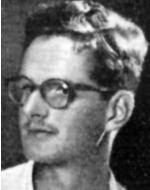Son of Dina and Zusman, was born on the holiday of Sukkot, October 2, 1928 in the city of Chemnitz, Germany. The birth of Moshe delayed his parents’ immigration to Israel, because his name was not included in the certificate they received before he was born, and their immigration was postponed for 10 years. After receiving a new certificate, they arrived in Israel in September 1938 and Moshe at the age of 10. He spent his first five years in Germany and five years in Belgium, where he visited an elementary school in French. In Israel, he continued his studies at the Balfour Gymnasium in Tel Aviv, which he completed in 1947. He studied diligently, knew languages and excelled in mathematics and natural sciences. “Moshe was going to continue his studies at the Hebrew Technion in Haifa, and even managed to register with him a short time before they fell. During his years of high school, he served in the Gadna and auxiliary services in the activities of the “black Sabbath” (29.6.1946) in Tel Aviv, and even served as an active member of the rowing club. He was a member of the Gordonia youth movement, where he served as an educator and mentor, and spent his holidays in Hanita, where he had a second home, and even spent his year in Nutrut, after completing his high school. And during the period of his service in Nutrat, he was first put on the battlefield test with the gangs and was able to stand in. He was a member of Nahariya’s moving guard and participated in the escort The convoy of Hanita, Haifa and Haifa through Wadi Rushmiya and back on the march to Nahariya and the Krayot, organized by the commander of the Zevulun district on behalf of the Haganah son of-Ami on March 26, 1948, was one of the transporters of food, water and ammunition to Yehiam at night. In May 1948, he enlisted with all the members of the “Guard” and served in the “Carmeli” Brigade, was a sapper, completed a squad commanders’ course, and was recommended to take up the position of platoon commander. Moshe participated in the battles for John, Janine and others, and was later transferred to the Eastern Galilee. The Sheikh Abed outpost near Manara was held by our forces. On October 22, 1948, during the second truce, Kaukji’s forces attacked the outpost unexpectedly and fell into their hands. On the same day, an armored company of the Carmeli Brigade attacked an attempt to retake the outpost, but without success. The next day another attack took place, but this time too, without success. He was brought to rest in the military cemetery in Rosh Pina, and as a commander he was diligent in the welfare of his fellow soldiers, even under the most difficult conditions, and instilled in them a spirit of security and courage, loyalty and dedication to their holy duty. In March he marched fearlessly in the head of his squad for the enemy, and his comrades admired him as a symbol of devotion, faith and passion in carrying out his duties. Towards the responsible and heavy task. “There’s nothing, we’ll finish with the enemy and we’ll be home in the evening.” He fell, but in his death saved the lives of many of us. “” We stood few against many, facing an enemy far greater than us, and the late Moses encouraged us, calmed us and courageously in our hearts. He knew what he was fighting for, and he used to dedicate his faith to his son, to console the wounded man, to calm his spirits, to encourage him and to restore his faith in life. He was an example commander, and it was clear to all of us that the people under his command May it be”After his death, he was declared a member of Hanita and one of its victims. In his memory, his group published the booklet” Words in Memory of Moshe “.
